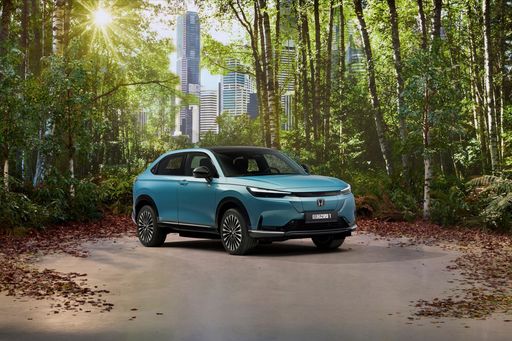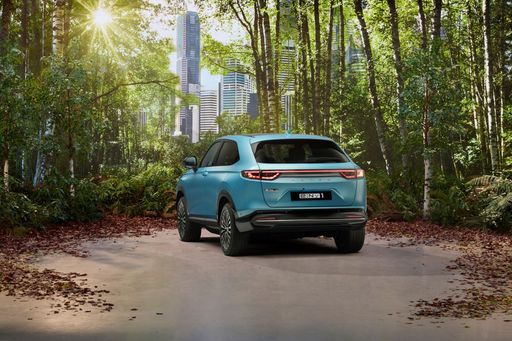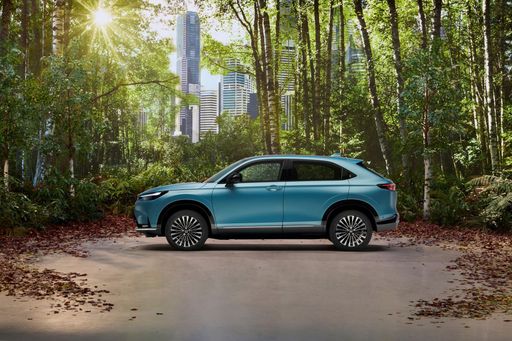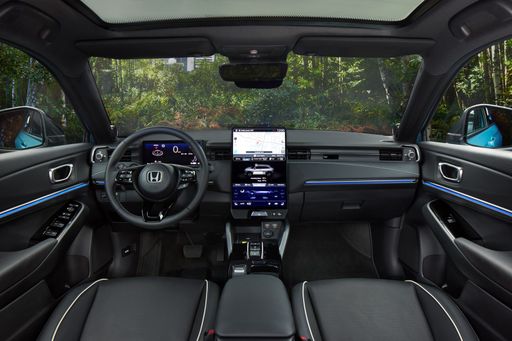Honda e:Ny1 vs Peugeot Partner – Differences & prices compared
Compare performance, boot space, consumption and price in one view.
Find out now: which car is the better choice for you – Honda e:Ny1 or Peugeot Partner?
The Honda e:Ny1 (SUV) comes with a Electric engine and Automatic transmission. In comparison, the Peugeot Partner (Cargo Van) features a Electric, Diesel or Petrol engine with Automatic or Manuel transmission.
When it comes to boot capacity, the Honda e:Ny1 offers 361 L, while the Peugeot Partner provides 1800 L – depending on how much space you need. If you’re looking for more power, decide whether the 204 HP of the Honda e:Ny1 or the 136 HP of the Peugeot Partner suits your needs better.
In terms of consumption, the values are 18.20 kWh per 100 km for the Honda e:Ny1, and 17.40 kWh5.20 L for the Peugeot Partner.
Price-wise, the Honda e:Ny1 starts at 33400 £, while the Peugeot Partner is available from 20500 £. Compare all the details and find out which model fits your lifestyle best!
Honda e:Ny1
The Honda e:Ny1 embodies the brand's vision for a sustainable and stylish urban driving experience. With its distinctive design and advanced technology, it offers a glimpse into the future of electric mobility. Inside, the cabin showcases a minimalist yet functional aesthetic, providing comfort and connectivity for modern drivers.
details @ hondanews.eu
@ hondanews.eu
 @ hondanews.eu
@ hondanews.eu
 @ hondanews.eu
@ hondanews.eu
 @ hondanews.eu
@ hondanews.eu
Peugeot Partner
The Peugeot Partner is a versatile and practical vehicle, ideal for both urban and rural settings. Its spacious interior and adaptable seating make it a popular choice for families and businesses alike. With a focus on reliability and efficiency, the Partner is well-suited to meet the demands of everyday transport.
details

|
|
|
|
|
Costs and Consumption |
|
|---|---|
|
Price
33400 - 36000 £
|
Price
20500 - 33800 £
|
|
Consumption L/100km
-
|
Consumption L/100km
5.2 - 6.3 L
|
|
Consumption kWh/100km
18.20 kWh
|
Consumption kWh/100km
17.40 kWh
|
|
Electric Range
412 km
|
Electric Range
354 km
|
|
Battery Capacity
-
|
Battery Capacity
-
|
|
co2
0 g/km
|
co2
0 - 143 g/km
|
|
Fuel tank capacity
-
|
Fuel tank capacity
53 - 61 L
|
Dimensions and Body |
|
|---|---|
|
Body Type
SUV
|
Body Type
Cargo Van
|
|
Seats
5
|
Seats
2 - 5
|
|
Doors
5
|
Doors
4 - 5
|
|
Curb weight
1730 kg
|
Curb weight
1329 - 1813 kg
|
|
Trunk capacity
344 - 361 L
|
Trunk capacity
1800 L
|
|
Length
4387 mm
|
Length
4401 - 4751 mm
|
|
Width
1790 mm
|
Width
1848 mm
|
|
Height
1584 mm
|
Height
1796 - 1812 mm
|
|
Payload
350 kg
|
Payload
611 - 991 kg
|
Engine and Performance |
|
|---|---|
|
Engine Type
Electric
|
Engine Type
Electric, Diesel, Petrol
|
|
Transmission
Automatic
|
Transmission
Automatic, Manuel
|
|
Transmission Detail
-
|
Transmission Detail
Manual Gearbox, Automatic Gearbox
|
|
Drive Type
Front-Wheel Drive
|
Drive Type
Front-Wheel Drive
|
|
Power HP
204 HP
|
Power HP
102 - 136 HP
|
|
Acceleration 0-100km/h
7.60 s
|
Acceleration 0-100km/h
11.2 - 14.8 s
|
|
Max Speed
160 km/h
|
Max Speed
135 - 184 km/h
|
|
Torque
310 Nm
|
Torque
205 - 300 Nm
|
|
Number of Cylinders
-
|
Number of Cylinders
3 - 4
|
|
Power kW
150 kW
|
Power kW
75 - 100 kW
|
|
Engine capacity
-
|
Engine capacity
1199 - 1499 cm3
|
General |
|
|---|---|
|
Model Year
2023
|
Model Year
2024
|
|
CO2 Efficiency Class
A
|
CO2 Efficiency Class
A, E
|
|
Brand
Honda
|
Brand
Peugeot
|
Honda e:Ny1
A Glimpse into the Future: The Honda e:Ny1
The automotive industry is no stranger to innovation, and Honda continues to spearhead this movement with its all-electric Honda e:Ny1 SUV. This vehicle represents the brand's commitment to energy efficiency, modern design, and cutting-edge technology, offering a remarkable driving experience that sets a new standard in the electric vehicle (EV) market.
Performance and Powertrain
At the heart of the Honda e:Ny1 is a robust electric motor that delivers an impressive 204 PS, equivalent to 150 kW, ensuring a dynamic and responsive driving experience. The vehicle can accelerate from 0 to 100 km/h in a brisk 7.6 seconds, making it one of the more swift options among electric SUVs. Thanks to a finely tuned reduction gearbox, the Honda e:Ny1 achieves a maximum speed of 160 km/h.
Efficiency Meets Range
The Honda e:Ny1 excels in energy efficiency, with a consumption rate of 18.2 kWh per 100 km. Even more impressively, it offers a substantial electric range of 412 km on a single charge, allowing drivers to confidently tackle longer journeys without frequent stops for recharging. Emphasising sustainability, the vehicle proudly holds a CO2 efficiency class of 'A', with zero emissions, further establishing its place in the realm of eco-friendly transportation.
Innovative Design and Comfort
Honda's design philosophy shines through in the e:Ny1, combining sleek aesthetics with practical features. Boasting a body length of 4,387 mm, a width of 1,790 mm, and a height of 1,584 mm, the SUV provides a spacious interior that comfortably seats five passengers. The design also incorporates a flexible boot space of 344 to 361 litres, accommodating various cargo needs.
Comfort is at the forefront of the e:Ny1's design, enhanced by standard features found in its Advance Package. These amenities are strategically designed to ensure a pleasant driving experience, be it through enhanced seating ergonomics or advanced climate control.
Technological Advancements
The Honda e:Ny1 is laden with technological innovations that are intuitive and user-friendly. From an advanced infotainment system to driver assistance features that ensure safety and ease, the SUV integrates technology seamlessly into the driving experience. This vehicle is equipped to meet modern connectivity needs, incorporating interfaces that are compatible with a range of digital platforms.
Investment Value and Running Costs
With a price range between €38,990 and €41,990, the Honda e:Ny1 represents a valuable investment for those looking towards electric mobility. Monthly running costs range from €1,125 to €1,171, with cost per kilometre between €0.45 and €0.469, reflecting its efficiency and low operational expenses.
Conclusion: Leading the Charge
The Honda e:Ny1 SUV encapsulates a perfected blend of power, efficiency, and style. With its impressive range, cutting-edge technology, and comfortable design, it stands as a tantalising choice for anyone considering the leap to electric vehicles. As Honda drives forward into the new era of automotive innovation, the e:Ny1 marks a significant milestone on the road to sustainable transport solutions.
Peugeot Partner
Exploring the Peugeot Partner: A Blend of Versatility and Innovation
The Peugeot Partner has long been a staple in the world of light commercial vehicles, offering practicality and reliability. However, with the latest iterations, Peugeot has taken a bold step by integrating advanced technology and modern design to create a vehicle that's not just functional, but also efficient and environmentally friendly. Let's dive into the technical details and innovations that make the latest Peugeot Partner a standout choice in its class.
Efficient Powertrains: Diesel, Petrol, and Electric Choices
The 2024 Peugeot Partner provides a wide range of powertrains to suit different needs and preferences. Whether you're looking for the tried-and-tested efficiency of a diesel engine, the simplicity of petrol, or the future-ready appeal of electric, the Partner offers them all. With power outputs ranging from 102 to 136 PS and options for automatic and manual transmissions, it caters to those who desire flexibility in vehicle performance.
Embracing Electric: The E-Partner Revolution
One of the most notable features of the latest Peugeot Partner is the introduction of the e-Partner, an all-electric variant. This model comes equipped with a 50 kWh battery, providing a significant range of up to 354 km on a single charge, making it ideal for urban deliveries or longer commutes with no emissions. Its front-wheel-drive layout and electric motor deliver 136 PS, ensuring a lively yet smooth driving experience.
Room for More: Versatility and Cargo Space
Peugeot understands the importance of adaptability in commercial vehicles. The Partner offers up to 1,800 litres of cargo space, or the capacity to carry payloads ranging from 611 to 991 kg. Additionally, the choice of 4 to 5 doors and seating configurations from 2 to 5 seats ensures that the Partner can be customised to meet the specific needs of various business requirements.
Compact Yet Capable: Dimensions and Design
The Peugeot Partner showcases a clever balance of compact exterior dimensions and a spacious interior. With lengths between 4,401 mm and 4,751 mm, and a width of 1,848 mm, it delivers easy manoeuvrability in urban environments without compromising on cargo capacity. The height ranges from 1,796 mm to 1,812 mm, ensuring stability and on-road presence.
An Eye on Sustainability: CO2 Emissions and Efficiency
Peugeot's commitment to sustainability is evident in the Partner's diverse powertrain options and their associated CO2 emissions, which range from zero for the electric variant to a maximum of 143 g/km for certain internal combustion engine models. This variety allows businesses to choose based on their environmental goals as well as operational needs.
A Multi-Talented Performer: Performance and Practicality
With acceleration figures from 0-100 km/h in just 11.2 seconds for some models and a top speed of up to 184 km/h, the Partner is not just about practicality; it's also about performance. The available torque between 205 and 300 Nm contributes to confident driving dynamics whether navigating urban settings or cruising on the motorway.
Conclusion: The Partner of the Future
The Peugeot Partner continues to be a frontrunner in the small van segment, thanks to its innovative approach to design, fuel efficiency, and technological integration. By providing a range of powertrain options and configurations, the Partner meets the diverse needs of today's businesses while keeping an eye firmly on the future. Whether opting for the environmentally friendly e-Partner or the robust diesel variant, Peugeot has crafted a vehicle that truly earns the name "Partner".
The prices and data displayed are estimates based on German list prices and may vary by country. This information is not legally binding.
